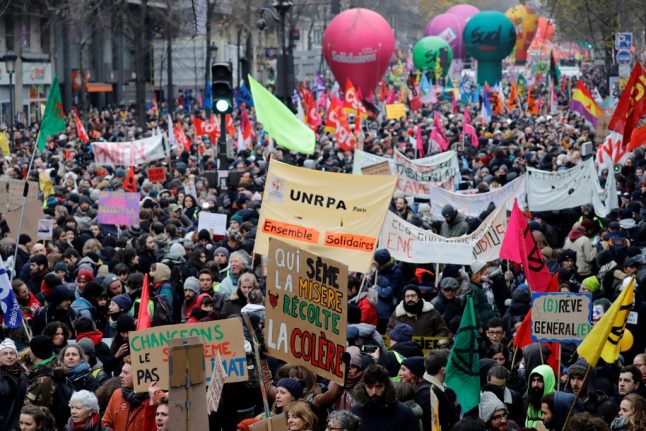Workers who strike in France are not paid, and receive no union funding, so instead unions organise cagnottes – collection pots – for donations to give to the striking workers.
The money is collected from members of the public and distributed to the workers. As well as serving a practical purpose, cagnottes can also be a useful tool in assessing the level of public support for strike action.
READ ALSO Here are the transport services running in France on December 27th
???#CaisseDeGreve : LE MILLION D'EUROS FRANCHI OFFICIELLEMENT ??? C'est qui les meilleurs ? Ce sont les donateurs et les travailleurs. MERCI À TOUS ???La lutte continue et la Caisse de grève aussi jusqu'au retrait : https://t.co/ZPmu03YqVi pic.twitter.com/fQcCwFJ16O
— Info'Com-CGT (@InfoComCGT) December 26, 2019
On Wednesday the CGT union – one of the more hardline unions and well represented among train drivers – announced that its cagnotte had topped the €1 million mark since being launched on the first day of the strikes on December 5th.
“This is concrete proof of the support of a large part of the population,” Marianne Ravaud, Deputy Secretary General of the union, told France Info.
“We receive cheques from all over France, from private sector employees, teachers and pensioners.”
The money had been collected by a variety of the methods from traditional collection buckets outside the RATP headquarters in Paris to more high tech methods such as online collections and a donation stream from video game fans on the Twitch platform, which raised more than €100,000.
The money will be distributed to striking workers, including a €250,000 donation to employees of the Paris RATP transport network.
Since the start of the strike action, now entering its fourth week, public support has remained fairly consistent.
Before the action started around 60 percent of people said they supported the strikers. After two weeks that had fallen, but not by much and stood at around 54 percent.
READ ALSO EXPLAINED What level of support do striking workers enjoy in France?
Several other collections have also been organised by different unions across France.



 Please whitelist us to continue reading.
Please whitelist us to continue reading.
The headline should read “just around €1 million donated to striking workers in France”. It should honestly signify how the local population in France are annoyed by the striking workers who are more privileged. The media should refrain from cresting a sense of “anarchism is great” attitude.